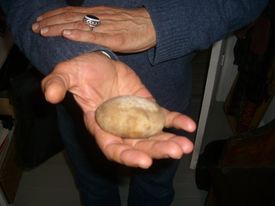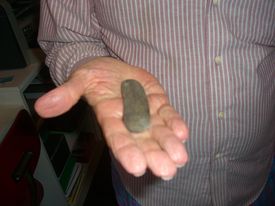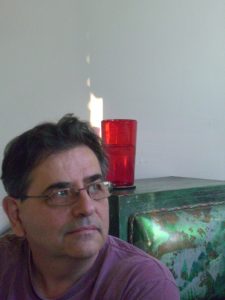Lewis Warsh and Bill Kushner,
a Friendship
When Lewis Warsh and Bernadette Mayer lived in the East Village in the 1980s and 1990s, they had birthday parties for their children where not only other children showed up, but Lewis and Bernadette’s friends as well to say hello and eat and drink and wander from room to room and conversation to conversation. The apartment on East Fourth Street, as I remember it, had a wide entrance, a hallway made less wide by floor to ceiling bookshelves that greeted one immediately on the left, stuffed thick with books and magazines that included all of Lewis and Bernadette’s United Artist publications. I wish I could go back and pick through them. Some of the poets at the party were also published on those United Artists’ bookshelves—Hannah Weiner, Steve Carey, and Bill Kushner quickly come to mind. I wish I could go back and talk to them.


At one of these parties, I was talking to Bill when Lewis who was walking by noticed us and led Bill by the hand out to the edge of the party chatter on a narrow bit of space where he began to do a simple fox trot to whatever song was playing, slow slow quick quick, beautifully partnered deftly executed momentary dance steps that ended with a little swing when Lewis twirled Bill back to me again, and we continued talking.
At the time of that dance, Lewis and Bernadette had already published Bill’s Head, a book whose genesis began in a workshop Lewis ran at The Poetry Project in 1975, a workshop that included fledgling writers I admire like Maggie Dubris, Yuki Hartman, and Patricia Spears Jones. Maggie recently told me that Lewis’ workshop was seminal. I know Bill began the workshop a doubting poet and ended an aspiring one. Lewis and Bill’s dance that I remember shows how well they worked together, student and mentor, then writer and editor, and finally friend and friend. Speaking of Lewis, Bill said:
“I was a very repressed little Twinkie. In Lewis’ workshop I was trying to hide my homosexuality by writing abstractly, academically. It wasn’t until I wrote a poem called “Kiss” where I was just fooling around about kissing. Lewis said, “I think you’ve got it. I think you broke through.” Something to that effect. And I was so proud. It was like I finally connected to you know that important person, you know, your teacher becomes that important person, that important interest. It was like I broke through to my sister, to Lewis and I kept writing more stuff like that. It freed me, that kiss. Lewis freed me more than, I mean I’ve studied with a lot of people after Lewis, OK? I studied with Bernadette, with Alice Notley, Ted Berrigan, wonderful teachers, but Lewis was the first guy who really freed me. They were all pretty much teaching the New York School of Poetry. I think that Language Poetry sometimes can skirt true feelings, and I ah I came from the Bronx. I wasn’t from New York. Lewis was the great unlocker. Oh, Mr. Warsh! He’s helped me so much.”
If there hadn’t been a Lewis Warsh, I don’t think there would have been a Bill Kushner—Oh, there may have been a Bill Kushner writing plays where a character could be gay, but that character would never be him. Lewis gave Bill the permission to write poetry and be himself. And as much as the teacher changes the student, the student changes the teacher so I’m sure it was a knowing dance for them both, bookish boys from the Bronx, a heritage that made them, as Bill might have said, as happy as clams when they were together, a comfortable bond like an accent they both heard and spoke.
When I asked Bill if I could see “Kiss,” the poem that via Lewis had gotten him to write, he didn’t know where it was. It was only after Bill’s death, cleaning out his apartment, that I found “Kiss” in a mimeograph Lewis had published for the poets in his 1975 workshop. The mimeo was called 8:30 and the poem wasn’t “Kiss,” it was “Kisses,” a flowing poem of six five-line stanzas, the poem from Lewis’ workshop that allowed Bill Kushner to go on and complete his masterpiece, Head.
Kisses
There are kisses that swiftly happen, oh so
solidly planted on one’s lips so that
there is no hope in a kiss like that
especially for the giver, it’s a dead
giveaway which says: take me! I am all
yours! And what is the receiver to do,
having in his power the person whose face
is so touchingly, vulnerably tilted before
him in a position of absolute surrender, that
is, if we were to talk in terms of war
and what is a kiss if not a moment
of peace in the midst of our ever
constant battle for survival? Every
kiss thrown my way disarms me immediately
and starts me to trembling, so that I must
put down my guns and forget my knives
and leaves me simply staring at the stars
with a rather limpid smile, so that strangers
looking at me must think me terribly mad
when quite the opposite is actually true. A kiss
says: I am happy with you. A kiss
says: Isn’t life good? A kiss says
many things to many people, but none
of these things can be bad. Kissing is
a nice way to begin and end each day,
as long as it is done with one’s total
being. Oh please, no more idle conversation,
so the kisser would seem to be saying to
the kissed. Let us now observe each
other with wonder, in silence, my love.
Lewis included a few poems of his own in 8:30. The first is untitled and I was interested to see that it ends with a kiss:
I temper words with speech
& speech with sound; my socks
go on first, or lastly
I’m proud just to be waking outside
my dreams are a whole life, torn & frayed
& what I’ve said I’ve nurtured & served
made my dalliances casual & reserved
my right to make my whims palpable, be public
on a soap-box or dove-like, not plastic
I’ll choose who I want to be with but wait
for them to call, also, not a victim but pleasurable
occurrence, when they do, knowing they’ve missed something
if not who they say they are I take them at random
I like a lot of effort to go into my time & when it passes
something exists, on paper, inviolable, a kiss
At the time of his death, Lewis was editing some of Bill’s unpublished poems that had been left behind in many notebooks. He wanted to include the interview I had done with Bill in the selected poems he was going to publish, and I said of course. As things are turning out, I may become involved in finishing the book that Lewis wanted. Not only was Lewis an entertaining writer and a focused teacher, he was a tireless editor; I wish he were here now.
 DON YORTY is the author of A Few Swimmers Appear, Poet Laundromat, Spring Sonnets, and What Night Forgets. His blog, an archive of current art, his own writing, and work of other poets, can be found at www.donyorty.com.
DON YORTY is the author of A Few Swimmers Appear, Poet Laundromat, Spring Sonnets, and What Night Forgets. His blog, an archive of current art, his own writing, and work of other poets, can be found at www.donyorty.com.

